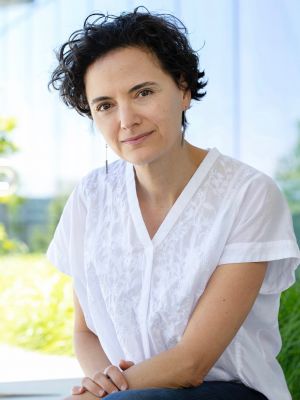
Carolina Trujillo, Ph.D.
Sr. Research Associate
Carolina obtained her Ph.D. in Microbiology from Boston University. In 2009 she joined Dr. Sabine Ehrt’s Lab as a Postdoctoral Associate and has contributed to multiple projects in the lab including efforts to characterize mechanisms important for Mycobacterium tuberculosis virulence, validation of new drug targets for tuberculosis, and identifying molecular processes required for paucibacillary persistence.
Publications:
Gengenbacher, M., M. D. Zimmerman, J. P. Sarathy, F. Kaya, H. Wang, M. Mina, C. Carter, M. A. Hossen, H. Su, C. Trujillo, S. Ehrt, D. Schnappinger and V. Dartois (2020). "Tissue Distribution of Doxycycline in Animal Models of Tuberculosis." Antimicrobial Agents and Chemotherapy 64(5): e02479-02419.
Puckett, S., C. Trujillo, Z. Wang, H. Eoh, T. R. Ioerger, I. Krieger, J. Sacchettini, D. Schnappinger, K. Y. Rhee and S. Ehrt (2017). "Glyoxylate detoxification is an essential function of malate synthase required for carbon assimilation in Mycobacterium tuberculosis." Proc Natl Acad Sci U S A 114(11): E2225-E2232.
Trujillo, C., A. Blumenthal, J. Marrero, K. Y. Rhee, D. Schnappinger and S. Ehrt (2014). "Triosephosphate isomerase is dispensable in vitro yet essential for Mycobacterium tuberculosis to establish infection." mBio 5(2): e00085.
Johnson, E. O., E. LaVerriere, E. Office, M. Stanley, E. Meyer, T. Kawate, J. E. Gomez, R. E. Audette, N. Bandyopadhyay, N. Betancourt, K. Delano, I. Da Silva, J. Davis, C. Gallo, M. Gardner, A. J. Golas, K. M. Guinn, S. Kennedy, R. Korn, J. A. McConnell, C. E. Moss, K. C. Murphy, R. M. Nietupski, K. G. Papavinasasundaram, J. T. Pinkham, P. A. Pino, M. K. Proulx, N. Ruecker, N. Song, M. Thompson, C. Trujillo, S. Wakabayashi, J. B. Wallach, C. Watson, T. R. Ioerger, E. S. Lander, B. K. Hubbard, M. H. Serrano-Wu, S. Ehrt, M. Fitzgerald, E. J. Rubin, C. M. Sassetti, D. Schnappinger and D. T. Hung (2019). "Large-scale chemical-genetics yields new M. tuberculosis inhibitor classes." Nature 571(7763): 72-78
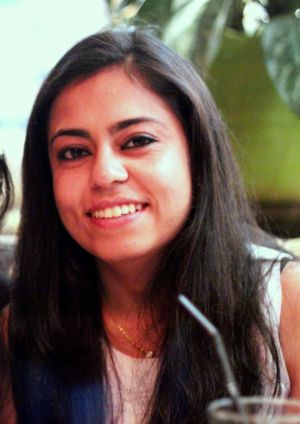
Shipra Grover, Ph.D.
Postdoctoral Associate
I am a new postdoctoral associate who joined Dr. Dirk Schnappinger’s laboratory at Department of Microbiology and Immunology, Weill Cornell in April 2014. Prior to arriving at Cornell, I obtained my PhD in Molecular Microbiology from the University of Birmingham, UK under the supervision of Prof. Gurdyal S. Besra. I am currently working on the TresCantos Open Lab project which is a collaborative effort between Schnappinger Lab at Weill Cornell and Tres Cantos Open Lab foundation, Galaxo Smith Kline, Spain. I am focusing on employing high throughput methods for screening of anti-mycobacterial compounds against the essential genes of mycobacteria and evaluating their potential as drug targets.
Publications:
S. Grover,L. J. Alderwick, A. K. Mishra, A. Bhatt, G.S. Besra, Benzothiazinones mediate killing of Corynebacterianeae by blocking decaprenyl phosphate recycling involved in cell wall biosynthesis. Journal of Biological Chemistry 2014, 289, 6177-6187
Meike Baumgart, Kerstin Luder, Shipra Grover, Cornelia Gätgens , Gurdyal S. Besra, Julia Frunzke, IpsA, a novel LacI-type regulator, is required for inositol-1 derived lipid formation in Corynebacteria and Mycobacteria. BMC Biology 2013, 11:122
S. Grover*, M. Jankute*, A. K. Rana, G. S. Besra, Arabinogalactan and lipoarabinomannan biosynthesis: structure, biogenesis and their potential as drug targets. Future Microbiol 2012 Jan;7(1):129-47.
S. Grover*, M. Jankute*, H. Birch, G.S. Besra, Genetics of Arabinogalactan and Lipoarabinomannan biosynthesis. Molecular Genetics of Mycobacteria Second Ed. ASM Press. (Accepted, in press)
*Co-authored
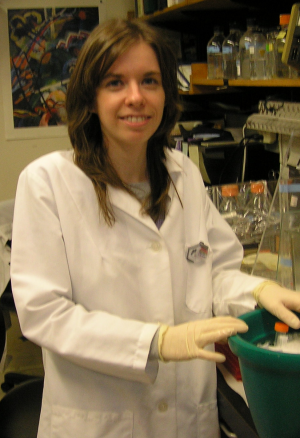
Jeanette Sutherland, Ph.D.
Research Associate
Jeanette Sutherland completed her Ph.D. in Biochemistry and Molecular Biology at New York Medical College. She studied the repair mechanism of stabilized bacterial topoisomerase I cleavage complexes as part of an overall strategy to develop antibacterial drugs targeting topoisomerase I.
She joined the Holloman lab in July of 2011 and is currently working on how homologous recombination functions in DNA repair to maintain genomic stability.
Publications:
Kojic, M, Sutherland JH, Pérez-Martín J, and Holloman WK. (2013). Initiation of meiotic recombination in Ustilago maydis. Genetics. 195(4):1231-40.
Liu IF, Sutherland JH, Cheng B, and Tse-Dinh, YC. (2011). Topoisomerase I function during E. coli response to antibiotics and stress enhances cell killing from stabilization of its cleavage complex. J. Antimicrob. Chem. 66(7):1518-24.
Sutherland JH and Tse-Dinh YC. (2010). Analysis of RuvABC and RecG involvement in E. coli response to covalent topoisomerase-DNA complex. J Bacteriol. 192(17):4445-4451.

Ruojun Wang, Ph.D.
Postdoctoral Associate
Ruojun grew up in Shanghai and graduated from Fudan University before moving to NYC for graduate school at Weill Cornell Medicine in 2012. She joined the Ehrt lab in 2013 as a Ph.D. student and is currently a postdoctoral associate. Her research focuses on the microbial and host components that facilitate the persistence of Mycobacterium tuberculosis in the body. Outside of the lab, Ruojun enjoys traveling and taking photos of squirrels in Central Park.
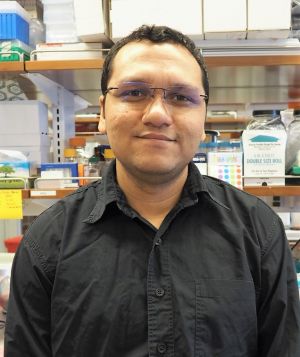
Arka Banerjee, PhD
Postdoctoral Associate
Arka is originally from Kolkata, India. After completing his MSc from the Department of Biotechnology, University of Calcutta, Kolkata, Arka obtained his PhD from the Indian Institute of Science (IISc), Bangalore, under the guidance of Prof Sandhya S. Visweswariah. He joined the laboratory of Prof Dirk Schnappinger as a Postdoctoral Associate in 2018 at the Department of Microbiology and Immunology, WCM. His current research interests focus on developing directed regulatory switches in mycobacteria and use them to better understand their cellular physiology. In his free time, Arka enjoys cooking and reading about popular science and current affairs.
Publications:
Samanta, S., Biswas, P., Banerjee, A., Bose, A., Siddiqui, N., Nambi, S., Saini, D. K., and Visweswariah, S. S. (2020) A universal stress protein in Mycobacterium smegmatis sequesters the cAMP-regulated lysine acyltransferase and is essential for biofilm formation. J. Biol. Chem. 295(6):1500-1516.
Banerjee, A., and Visweswariah, S. S. (2016) Separation of free and bound cAMP in mycobacteria. Bio-protocol 6(14):e1879.
Banerjee, A., Adolph, R. S., Gopalakrishnapai, J., Kleinboelting, S., Emmerich, C., Steegborn, C., and Visweswariah, S. S. (2015) A universal stress protein (USP) in mycobacteria binds cAMP. J. Biol. Chem. 290(20):12731-43.
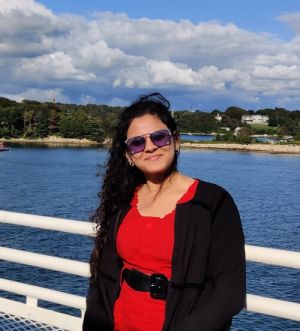
Divya Beri, PhD
Postdoctoral Associate
Divya joined the Kafsack Lab after completing her PhD with Utpal Tatu at the Indian Institute of Science in Bangalore, India. There she found that malaria parasites lack the ability to recycle homocysteine via the transulfuration pathway, instead accumulating and exporting the metabolite. These increased homocysteine concentrations promote gametocytogenesis in P. falciparum. Divya also worked with a variety of other protozoan parasites. When not in lab, she enjoys traveling, reading, running and socializing with friends and family.
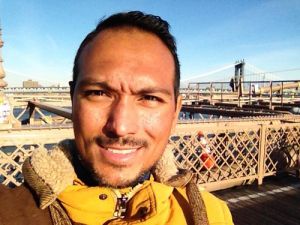
Riward Campelo, PhD
Postdoctoral Associate
Riward hails from Caracas, Venezuela where he completed his Ph.D. at the Central University of Venezuela in 2015. His graduate research under Dr. José Luis Ramirez focused on biochemical characterization of kinetoplasmid telomerases. Riward has been the recipient of a number of awards including selection in the Novartis Next Generation Scientist Program. He Joined the Kafsack Lab in 2015. When he's not in the lab, Riward enjoys old-school video games and is a big sneakerhead.
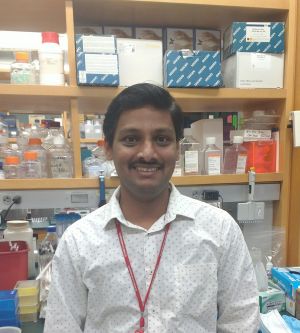
Devidas Chaturbhuj, Ph.D.
Postdoctoral Associate
I completed my Ph.D. (Health & Biological Sciences) from Symbiosis International Deemed University in 2019. I worked at National AIDS Research Institute (ICMR), Pune, India. During my tenure here, I worked on various aspects of HIV drug resistance. In my Ph.D. course, I studied the HIV-1 Gag mutations among protease inhibitor experienced patients and its role in virus release and replication.
I joined Dr. John Moore’s lab as a postdoctoral associate at Department of Microbiology & Immunology, Weill Cornell Medicine in January 2020. I am currently working on cleaved, stabilized HIV-1 Env trimers for structural and vaccine studies.

Di Qu, PhD
Postdoctoral Associate
Di Qu obtained her Ph.D. in Institut Pasteur of Shanghai, Chinese Academy of Sciences, Shanghai. During her Ph.D. study, she mainly focused on the molecular mechanisms of HIV-1 replication and latency in Dr. Jianhua WANG’s laboratory. She joined Dr. Dirk Schnappinger’s laboratory at Department of Microbiology and Immunology, Weill Cornell Medical in November 2017. At present, she is working on the metabolism of Mycobacterium tuberculosis, specifically biotin synthesis, in attempt to validate new drug targets for tuberculosis treatment.
Publications:
Qu D, Sun WW, Li L, Ma L, Sun L, Jin X, Li T, Hou W, Wang JH. (2019) Long noncoding RNA MALAT1 releases epigenetic silencing of HIV-1 replication by displacing the polycomb repressive complex 2 from binding to the LTR promoter. Nucleic Acids Res. 47(6):3013-3027.
Qu D, Li C, Sang F, Li Q, Jiang ZQ, Xu LR, Guo HJ, Zhang C, Wang JH. (2016) The variances of Sp1 and NF-κB elements correlate with the greater capacity of Chinese HIV-1 B'-LTR for driving gene expression. Sci Rep. 6:34532.
Li C, Kuang WD, Qu D, Wang JH. (2016) Toll-interacting protein inhibits HIV-1 infection and regulates viral latency. Biochem Biophys Res Commun. 475(2):161-8.
Fu-Chun Yang, Wen-Dong Kuang, Chuan Li, Wei-Wei Sun, Di Qu, Jian-Hua Wang. (2015) Toll-Interacting Protein Suppresses HIV-1 Long-Terminal-Repeat-Driven Gene Expression and Silences the Post-Integrational Transcription of Viral Proviral DNA. PLoS One. 10(4):e0125563
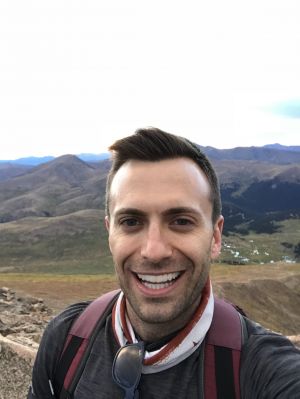
Curtis Engelhart, MSc
Sr. Research Associate
Curtis Engelhart completed his Bachelor of Science in Chemistry at North Dakota State University in Fargo in 2009, and completed a Master of Science in Medicinal Chemistry at the University of Minnesota in Minneapolis in 2012. He spent one year working at GlaxoSmithKline in Tres Cantos, Spain, to develop a targeted whole-cell screen for inhibitors of biotin protein ligase from Mtb. In February 2014 he joined Dirk Schnappinger’s lab. His current work focuses on early drug discovery and target validation of drug candidates in development from various academic and industrial collaborative partners via chemical susceptibility profiling of Mtb conditional knock-down mutants (in single- and mixed-strain formats) and isolation/characterization of resistant Mtb mutants. In his free time Curtis enjoys hiking, cycling, video gaming, and hanging out with his pets, Charlie the cat and Hulk the dog.
Publications:
Beites, T.; O’Brien, K.; Tiwari, D.; Engelhart, C.A.et al. Plasticity of theMycobacterium tuberculosisRespiratory Chain and Its Impact on Tuberculosis Drug Development. Nat. Commun.2019, 10, 4970.
Bockman, M. R.; Engelhart, C. A.et al. Investigation of (S)-(–)-Acidomycin: A Selective Antimycobacterial Natural Product that Inhibits Biotin Synthase.ACS Infect. Dis.2019, 5, 598–617.
Bockman, M. R.; Engelhart, C. A.et al. Avoiding Antibiotic Inactivation in Mycobacterium tuberculosisby Rv3406 through Strategic Nucleoside Modification. ACS Infect. Dis. 2018, 4, 1102–1113.
Neres, J. P.; Engelhart, C. A.et al. Non-nucleoside Inhibitors of BasE, An Adenylating Enzyme in the Siderophore Biosynthetic Pathway of the Opportunistic Pathogen Acinetobacter baumannii. J. Med. Chem. 2013, 56, 2385–2405.
Engelhart, C. A.; Aldrich, C. C. Synthesis of Chromone, Quinolone, and Benzoxazinone Sulfonamide Nucleosides as Conformationally Constrained Inhibitors of Adenylating Enzymes Required for Siderophore Biosynthesis. J. Org. Chem. 2013, 78, 7470–7481.

Ha-Na Lee, PhD
Postdoctoral Associate
Ha-Na received her Ph.D degree with the major of microbiology from Pusan National University in South Korea in Feb 2018. During her Ph. D, she studied the regulation of peroxide stress responses in Mycobacterium smegmatis. She joined the laboratory of Dr. Dirk Schnappinger in Apr 2018 and now is working on a project for identification and characterization of genes involved in the utilization of biotin in Mycobacterium tuberculosis.
Publications:
Roles of three FurA paralogs in the regulation of genes pertaining to peroxide defense in Mycobacterium smegmatis mc(2) 155. Lee HN, Ji CJ, Lee HH, Park J, Seo YS, Lee JW, Oh JI. Mol Microbiol. 2018 Jun;108(6):661-682. doi: 10.1111/mmi.13956. Epub 2018 Apr 15.
Inhibition of the DevSR Two-Component System by Overexpression of Mycobacterium tuberculosis PknB in Mycobacterium smegmatis. Bae HJ, Lee HN, Baek MN, Park EJ, Eom CY, Ko IJ, Kang HY, Oh JI. Mol Cells. 2017 Sep 30;40(9):632-642. doi: 10.14348/molcells.2017.0076. Epub 2017 Aug 25.
Regulation of the ahpC gene encoding alkyl hydroperoxide reductase in Mycobacterium smegmatis. Lee HN, Lee NO, Han SJ, Ko IJ, Oh JI. PLoS One. 2014 Nov 3;9(11):e111680. doi: 10.1371/journal.pone.0111680. eCollection 2014.
Involvement of the catalytically important Asp54 residue of Mycobacterium smegmatis DevR in protein-protein interactions between DevR and DevS. Lee HN, Lee NO, Ko IJ, Kim SW, Kang BS, Oh JI. FEMS Microbiol Lett. 2013 Jun;343(1):26-33. doi: 10.1111/1574-6968.12122. Epub 2013 Mar 26.
Protein-protein interactions between histidine kinases and response regulators of Mycobacterium tuberculosis H37Rv. Lee HN, Jung KE, Ko IJ, Baik HS, Oh JI. J Microbiol. 2012 Apr;50(2):270-7. doi: 10.1007/s12275-012-2050-4. Epub 2012 Apr 27.
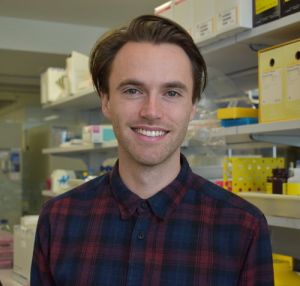
Kit Kennedy, PhD
Postdoctoral Associate
Kit came to the Kafsack Lab from the malaria research hotbed of Melbourne, Australia where he first did honors research with Brian Cooke at Monash University followed by a Ph.D. with Stuart Ralph at the University of Melbourne. In his thesis research Kit elegantly elucidated the molecular and cellular defects that underlie the delayed death of malaria parasites upon loss of their apicoplast. He was also a BoP student in 2017. When he’s not in the lab Kit likes to play bike polo or watch movies.

Gaelle Neveu, PhD
Postdoctoral Associate
Gaelle completed her PhD at Institut Cochin in Paris with Dr. Catherine Lavazec, where she developed an in vitro model of P. falciparum infection of erythrocyte precursors in the bone marrow parenchyma. Using this model, she found that infection with P. falciparum gametocytes delays erythroblast maturation to prevent the release of immature gametocytes into circulation. She joined the Kafsack lab in January 2020. Gaelle also likes playing badminton and gardening.

Yao Liu, PhD
Postdoctoral Associate
Yao Liu is from Yangzhou, China. He received his B.S. degree from Central South University (Changsha, China) in 2011 with a major in biotechnology. He joined Dr. Zhao-Qing Luo’s Lab at Purdue University in 2013, where he studied the modulation of actin cytoskeleton by L. pneumophila effector proteins. He obtained his Ph.D. degree in December 2018 and joined the Ehrt lab as a postdoctoral associate in March 2019. He is currently studying immune mediators that affect the relapse of tuberculosis.
Publications:
Gan, N.*, Zhen, Z.*, Liu, Y.*, Xu, X.*, He, C., Qiu, J., …& Luo, Z. Q. (2019) Regulation of phosphoribosyl ubiquitination by a calmodulin-dependent glutamylase. Nature, 572(7769), 387-391. * Equal contribution
Akturk, A., Wasilko, D. J., Wu, X., Liu, Y., Zhang, Y., Qiu, J., ... & Mao, Y. (2018). Mechanism of phosphoribosyl-ubiquitination mediated by a single Legionella effector. Nature, 557(7707), 729.
Liu, Y., Zhu, W., Tan, Y., Nakayasu, E. S., Staiger, C. J., & Luo, Z. Q. (2017). A Legionella effector disrupts host cytoskeletal structure by cleaving actin. PLoS pathogens, 13(1), e1006186.
Zhao, J., Beyrakhova, K., Liu, Y., Alvarez, C. P., Bueler, S. A., Xu, L., ... & Cygler, M. (2017). Molecular basis for the binding and modulation of V-ATPase by a bacterial effector protein. PLoS pathogens, 13(6), e1006394.
Luo, X., Wasilko, D. J., Liu, Y., Sun, J., Wu, X., Luo, Z. Q., & Mao, Y. (2015). Structure of the Legionella virulence factor, SidC reveals a unique PI (4) P-specific binding domain essential for its targeting to the bacterial phagosome. PLoS pathogens, 11(6), e1004965.

Francesca Florini, PhD
Postdoctoral Associate
Born and raised in Bologna (in Italy of course!), where I got my degree in Molecular Biotechnology. During my undergrad studies, I started to be fascinated by pathogens and the strategies they evolved to cope with their hosts. I then spent a summer in Tanzania and decided I wanted to work on tropical parasites. For this reason, I moved to Switzerland, where I did my PhD at the University of Bern, studying the parasite Trypanosoma brucei and its peculiar transcriptional machinery. Almost one year ago, staying faithful to the parasites world, I moved again to NYC for my Postdoc in Kirk Deitsch’s lab.
Outside work, I love all sports, with a deep passion for soccer, and I am very proud of my title of “Social Queen”, which I worked hard for!
Publications:
Flagellar cAMP signaling controls trypanosome progression through host tissues. Shaw S, DeMarco SF, Rehmann R, Wenzler T, Florini F, Roditi I, Hill KL. Nat Commun. 2019 Feb 18;10(1):803.
Unexpected diversity in eukaryotic transcription revealed by the retrotransposon hotspot family of Trypanosoma brucei. Florini F, Naguleswaran A, Gharib WH, Bringaud F, Roditi I. Nucleic Acids Res. 2019 Feb 28;47(4):1725-1739.
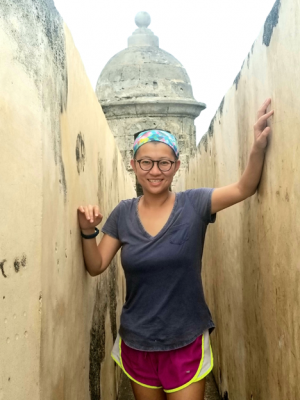
Xu Zhang
Postdoctoral Associate
At work, I am only interested in 28 chromosome ends and 60 var genes in Plasmodium falciparum. My work in the Deitsch lab focuses on the influence of chromatin structure on gene expression and DNA repair. Outside work, I am an outdoor person. I run, hike, travel and look for good food. At home, I am a decent cook and trying to grow some plants. I have a not so friendly cat and hopefully will have a second one soon. I believe that science is for every one and curiosity is the key. #BLM, #womeninscience
Publications:
Zhang, X., Deitsch, K.W. and Kirkman, L.A. (2020) The Contribution of Extrachromosomal DNA to Genome Plasticity in Malaria Parasites, Molecular Microbiology, In press.
Zhang, X., Alexander, N., Leonardi, I., Mason, C., Kirkman, L.A. and Deitsch, K.W. (2019) Rapid antigen diversification through mitotic recombination in the human malaria parasite Plasmodium falciparum. PLOS Biology, 17: e3000271.
Ukaegbu, U.E., Zhang, X., Heinberg, A.R., Wele, M., Chen, Q. and Deitsch, K.W. (2015) A unique virulence gene occupies a principal position in immune evasion by the malaria parasite Plasmodium falciparum. PLoS Genetics, 11: e1005234.

